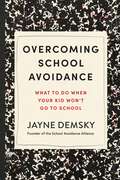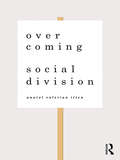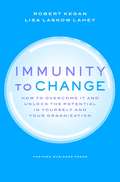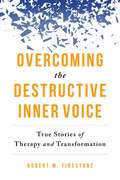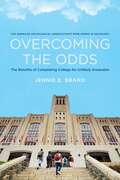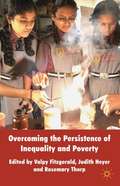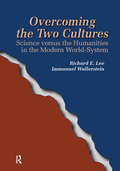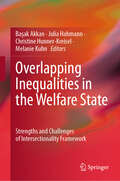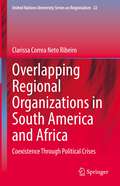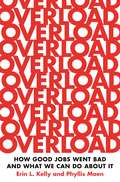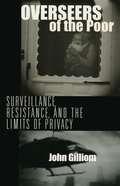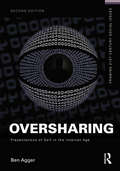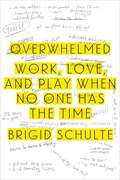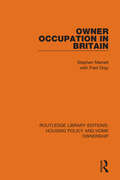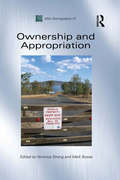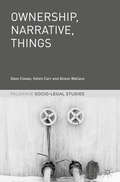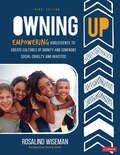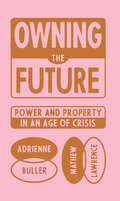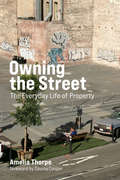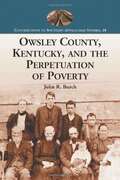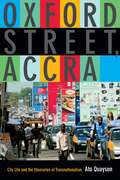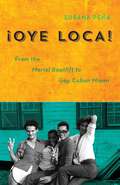- Table View
- List View
Overcoming School Avoidance: What to Do When Your Kid Won't Go to School
by Jayne DemskyA compassionate guide that tackles one of the fastest-growing issues facing families everywhere: the increasing number of children who are refusing or reluctant to attend school. When a child stops going to school, the entire family feels the impact. School avoidance may look like defiance, but it&’s often rooted in anxiety, depression, or other emotional challenges—and influenced by factors within the school environment that can make attendance feel overwhelming. Yet many families and educators are left unsure how to respond. In this groundbreaking guide, Jayne Demsky—founder of the School Avoidance Alliance—provides a practical roadmap for parents navigating this isolating and often overwhelming experience. Demsky offers strategies that help parents to confidently collaborate with schools, navigate truancy laws, and provide the emotional support kids need to return to a productive and fulfilling school life. Drawing on over a decade of experience supporting families, Demsky brings deep insight and unwavering commitment to this issue. Her perspective is further enriched by a diverse group of experts, professionals, and advocates who contributed their knowledge and expertise to this book, including these leading authorities: Dr. Christopher Kearney, Director, UNLV Child School Refusal & Anxiety Disorders Clinic; Dr. Daniel Villiers, counseling psychologist; cofounder, the Mountain Valley Treatment Center and the Anxiety Institute; and Dr. Mona Potter, child psychologist and psychiatrist; cofounder and CMO, InStride Health, and Assistant Professor of Psychiatry, Harvard Medical School.
Overcoming Social Division: Conflict Resolution in Times of Polarization and Democratic Disconnection
by Anatol Valerian IttenLocked in our worldview communities and polarised through increasingly radical campaigning, we are anxious of today's great uncertainty and our politicians have little incentive to reach across party lines. The problem of social division is real. The Brexit vote led to the highest spike in hate crimes in Britain ever recorded and heated situations like the far-right rally in Charlottesville, USA are increasingly boiling over. Overcoming Social Division is not another book about dying democracies, because horror scenarios don't make you act. Instead, it is an optimistic response on what can be done, and about how we can coexist in fragmented and polarised societies. Anatol Valerian Itten explains how public conflict resolution, civic fusion and mediative decision making help us re-learn the ability to find common ground on controversial issues with our fellow citizens, whom we tend to assume believe more extreme things than they really do. This book takes the reader through empirical key factors, obstacles and blind spots and provides helpful guidelines for everyone interested in mitigating social division and resolving conflicts. The author's insights are based on his experience in conflict management, a study of dozens of public conflict resolution cases and surprising stories of over twenty interviewed mediators. Overcoming social division can be a strenuous task. But talking to our enemies is necessary if we don't want to end up in dysfunctional democracies, and it can be a more rewarding experience than we might think. This is a fascinating read for students and academics interested in conflict resolution and public participation from psychology, social sciences, law, and related disciplines. It is also a unique resource for professionals including officials, mediators, lawyers and other practitioners dealing with conflict and public participation.
Overcoming Your Immunity to Change
by Lisa Laskow Lahey Robert KeganSeeing how your self-protective motivations systematically prevent you from achieving exactly what you most desire is necessary. Insights can be powerful, even exciting, but they do not necessarily lead to transformation. You need a structure to help channel your aspirations, test and gain distance from your assumptions, and steadily build a new set of strategies for bridging the gap between your intentions and behavior. This chapter outlines a process for overcoming your immunity to change once the problem has been diagnosed. This chapter is excerpted from "Immunity to Change: How to Overcome It and Unlock the Potential In Yourself and Your Organization."
Overcoming the Destructive Inner Voice: True Stories of Therapy and Transformation
by Robert W. FirestoneMany people grapple with destructive thought processes or a "critical inner voice" that directs their behavior and, to varying degrees, limits their lives. Using deeply personal and very human stories based on his own clinical practice, noted psychologist Robert W. Firestone illustrates the struggles of his clients to give words to this "enemy within," and in the process overcome its damaging influence. These revealing and captivating stories offer glimpses into the uniquely human relationship that develops in the therapeutic encounter and demonstrate the powerful impact that the experience has on both client and therapist.Dr. Firestone is the originator of a therapeutic method called "Voice Therapy," by which clients learn to identify the language of the defense system and eventually separate their own point of view from its harmful effects. Each story provides an intimate look into one person's life, illuminates aspects of his or her "dark side," and highlights an important insight into the therapeutic process.This sensitively written book will evoke emotional responses in readers, and inspire them to take action to challenge the dictates of their own inner critic. Taken together, these stories underscore the distinctive merits and continuing relevance of the therapeutic process, especially in our distracted, technological world increasingly detached from feeling.
Overcoming the Odds: The Benefits of Completing College for Unlikely Graduates (American Sociological Association's Rose Series)
by Jennie E. BrandEach year, millions of high school students consider whether to continue their schooling and attend and complete college. Despite evidence showing that a college degree yields far-reaching benefits, critics of higher education increasingly argue that college “does not pay off” and some students - namely, disadvantaged prospective college goers - would be better served by forgoing higher education. But debates about the value of college often fail to carefully consider what is required to speak knowledgeably about the benefits –what a person’s life might look like had they not completed college, or their college counterfactual. In Overcoming the Odds sociologist Jennie E. Brand reveals the benefits of completing college by comparing life outcomes of college graduates with their college counterfactuals. Drawing on two cohorts of nationally representative data from the Bureau of Labor Statistics National Longitudinal Surveys program, Brand uses matching and machine learning methods to estimate the effects of college completion across students with varying likelihoods of completing four-year degrees. To illustrate her findings, Brand describes outcomes using matched vignettes of college and non-college graduates. Brand shows that four-year college completion enables graduates to increase wages and household income, while also circumventing unemployment, low-wage work, job instability, poverty, and social assistance. Completing college also increases civic engagement. Most of these benefits are larger for disadvantaged than for more advantaged students, rendering arguments that college has limited benefits for unlikely graduates as flawed. Brand concludes that greater long-term earnings, and less job instability and unemployment, and thus more tax revenue, less reliance on public assistance, and high levels of volunteering indicate that public investment in higher education for students from disadvantaged backgrounds yields far-reaching collective benefits. She asserts that it is better for our society when more people complete college. Overcoming the Odds is an innovative and enlightening exploration of how college can transform lives.
Overcoming the Persistence of Inequality and Poverty
by Rosemary Thorp Valpy Fitzgerald Judith HeyerInternational experts evaluate new policy directions in economic development and poverty reduction, building on the ideas of a pioneer in the new discipline of Development Studies, Frances Stewart. Combing ideas and evidence on technological change, human development and conflict prevention to address the issue of the persistence of inequality
Overcoming the Two Cultures: Science vs. the Humanities in the Modern World-system
by Immanuel Wallerstein Richard E Lee JrThis book tells the story of how the very idea of two cultures-the so-called divorce between science and the humanities-was a creation of the modern world-system. The contributors, working from a common research framework, trace the divorce of "facts" and "values" as part of the transition from feudalism to capitalism. This led to a polarization between universalist "science" and the particularist "humanities" and finally to the creation of the social sciences as an uneasy intermediary in this epistemological debate. The book addresses the contemporary attempts to overcome the division between the two cultures that emerge from science, feminism, race and ethnic studies, cultural studies, and ecology, ending with an analysis of the culture wars and the science wars. Contributors: Volkan Aytar, Ay,se Betul Celik, Mauro Di Meglio, Mark Frezzo, Ho-fung Hung, Biray Kolloupglu K3/4rl3/4, Agustin Lao- Montes, Eric Mielants, Boris Stremlin, Sunaryo, Norihisa Yamashita, Deniz Yukeseker.
Overlapping Inequalities in the Welfare State: Strengths and Challenges of Intersectionality Framework
by Christine Hunner-Kreisel Melanie Kuhn Julia Hahmann Başak AkkanThe volume stresses the relevance of the intersectionality framework in welfare state analysis by examining overlapping inequalities within the shifting institutional boundaries and organisational processes across diverse welfare settings. The volume explores the strengths and challenges of theoretical and methodological approaches to intersectionality, addressing its spatial, temporal and comparative dimensions. It, therefore, adopts a critical and process-focused approach while recognising the agency of individuals as subjects of state policies. The contributions critically build the link between intersectionality and other theoretical frameworks and research paradigms, including Marxist social reproduction theory, critical race studies, Bourdieuan analysis of class, critical geography, childhood, queer, migration, and disability studies. The contributions provide insights into the institutional realms of health, education, social services, and care work and examine state practices of racial profiling and policing in distinct welfare states. Overall, the contributions illustrate the strengths of the intersectionality framework in empirical inquiries while providing critical reflections on its limitations. Readers across a diverse array of social science disciplines will find this book valuable.
Overlapping Regional Organizations in South America and Africa: Coexistence Through Political Crises (United Nations University Series on Regionalism #22)
by Clarissa Correa RibeiroThis book discusses the interaction between and the impact of overlapping actions by regional organizations while dealing with critical events. It compares all the sub-regions in South America and Africa from this perspective and creates new knowledge through cross-regional gleanings. The book analyses types of institutional interaction among regional organizations and the effects of overlapping actions on the coexistence or fracturing of regional processes. It examines and compares the dynamics of these interactions in both South America and Africa. The book contributes to the study of comparative regionalism by providing generalization and institutional learning based on a cross-regional approach. It gives to students, researchers and interested readers an understanding of the complexity of regional affairs in multi-organizational environments.
Overload: How Good Jobs Went Bad and What We Can Do about It
by Erin L. Kelly Phyllis MoenWhy too much work and too little time is hurting workers and companies—and how a proven workplace redesign can benefit employees and the bottom lineToday's ways of working are not working—even for professionals in "good" jobs. Responding to global competition and pressure from financial markets, companies are asking employees to do more with less, even as new technologies normalize 24/7 job expectations. In Overload, Erin Kelly and Phyllis Moen document how this new intensification of work creates chronic stress, leading to burnout, attrition, and underperformance. "Flexible" work policies and corporate lip service about "work-life balance" don't come close to fixing the problem. But this unhealthy and unsustainable situation can be changed—and Overload shows how.Drawing on five years of research, including hundreds of interviews with employees and managers, Kelly and Moen tell the story of a major experiment that they helped design and implement at a Fortune 500 firm. The company adopted creative and practical work redesigns that gave workers more control over how and where they worked and encouraged managers to evaluate performance in new ways. The result? Employees' health, well-being, and ability to manage their personal and work lives improved, while the company benefited from higher job satisfaction and lower turnover. And, as Kelly and Moen show, such changes can—and should—be made on a wide scale.Complete with advice about ways that employees, managers, and corporate leaders can begin to question and fix one of today's most serious workplace problems, Overload is an inspiring account about how rethinking and redesigning work could transform our lives and companies.
Overload: How Good Jobs Went Bad and What We Can Do about It
by Erin L. Kelly Phyllis MoenWhy too much work and too little time is hurting workers and companies—and how a proven workplace redesign can benefit employees and the bottom lineToday's ways of working are not working—even for professionals in "good" jobs. Responding to global competition and pressure from financial markets, companies are asking employees to do more with less, even as new technologies normalize 24/7 job expectations. In Overload, Erin Kelly and Phyllis Moen document how this new intensification of work creates chronic stress, leading to burnout, attrition, and underperformance. "Flexible" work policies and corporate lip service about "work-life balance" don't come close to fixing the problem. But this unhealthy and unsustainable situation can be changed—and Overload shows how.Drawing on five years of research, including hundreds of interviews with employees and managers, Kelly and Moen tell the story of a major experiment that they helped design and implement at a Fortune 500 firm. The company adopted creative and practical work redesigns that gave workers more control over how and where they worked and encouraged managers to evaluate performance in new ways. The result? Employees' health, well-being, and ability to manage their personal and work lives improved, while the company benefited from higher job satisfaction and lower turnover. And, as Kelly and Moen show, such changes can—and should—be made on a wide scale.Complete with advice about ways that employees, managers, and corporate leaders can begin to question and fix one of today's most serious workplace problems, Overload is an inspiring account about how rethinking and redesigning work could transform our lives and companies.
Overseers of the Poor: Surveillance, Resistance, and the Limits of Privacy
by John GilliomIn Overseers of the Poor, John Gilliom confronts the everyday politics of surveillance by exploring the worlds and words of those who know it best-the watched. Arguing that the current public conversation about surveillance and privacy rights is rife with political and conceptual failings, Gilliom goes beyond the critics and analysts to add fresh voices, insights, and perspectives.
Oversharing: Presentations of Self in the Internet Age (Framing 21st Century Social Issues)
by Ben AggerPeople ‘overshare’ when they interact with others through the screens of computers and smartphones. Oversharing means to divulge more of their inner feelings, opinions and sexuality than they would in person, or even over the phone. Text messaging, Facebooking, tweeting, camming, blogging, online dating, and internet porn are vehicles of this oversharing, which blurs the boundary between public and private life. This book examines these ‘presentations of self’, acknowledging that we are now much more public about what used to be private. With this second edition, Agger adds a new chapter on whether privacy is possible that addresses selfies, job loss due to oversharing, the surveillance state, and examples of when the private should go public.
Overwhelmed: Work, Love, and Play When No One Has the Time
by Brigid SchulteAccording to the Leisure Studies Department at the University of Iowa, true leisure is “that place in which we realize our humanity.” If that’s true, argues Brigid Schulte, then we're doing dangerously little realizing of our humanity. In Overwhelmed, Schulte, a staff writer for The Washington Post, asks: Are our brains, our partners, our culture, and our bosses making it impossible for us to experience anything but “contaminated time”?<P> Schulte first asked this question in a 2010 feature for The Washington Post Magazine: “How did researchers compile this statistic that said we were rolling in leisure—over four hours a day? Did any of us feel that we actually had downtime? Was there anything useful in their research—anything we could do?”<P> Overwhelmed is a map of the stresses that have ripped our leisure to shreds, and a look at how to put the pieces back together. Schulte speaks to neuroscientists, sociologists, and hundreds of working parents to tease out the factors contributing to our collective sense of being overwhelmed, seeking insights, answers, and inspiration. She investigates progressive offices trying to invent a new kind of workplace; she travels across Europe to get a sense of how other countries accommodate working parents; she finds younger couples who claim to have figured out an ideal division of chores, childcare, and meaningful paid work. Overwhelmed is the story of what she found out.
Owner-Occupation in Britain
by Stephen MerrettOriginally published in 1982, this is a companion volume to State Housing in Britain. Together the 2 volumes cover the tenure of some 85% of all British households in much of the 20th Century. The development of the tenure between 1918 and 1970 with special reference to its position in state housing policies is examined. Subsequent chapters analyse effective demand since 1970, both with respect to its demographic base and as regards the capacity to buy. In particular the question of why people want to buy is asked and the supply of housing (both council houses and former private rented accommodation) as well as the output of speculative housebuilders is considered. A detailed survey of the perturbations in the housing market during the volatile experience of the British economy since 1970 is also covered.
Owners of the Sidewalk: Security and Survival in the Informal City
by Daniel M. GoldsteinMany of Bolivia's poorest and most vulnerable citizens work as vendors in the Cancha mega-market in the city of Cochabamba, where they must navigate systems of informality and illegality in order to survive. In Owners of the Sidewalk Daniel M. Goldstein examines the ways these systems correlate in the marginal spaces of the Latin American city. Collaborating with the Cancha's legal and permanent stall vendors (fijos) and its illegal and itinerant street and sidewalk vendors (ambulantes), Goldstein shows how the state's deliberate neglect and criminalization of the Cancha's poor--a practice common to neoliberal modern cities--makes the poor exploitable, governable, and consigns them to an insecure existence. Goldstein's collaborative and engaged approach to ethnographic field research also opens up critical questions about what ethical scholarship entails.
Ownership and Appropriation (ASA Monographs #7)
by Veronica StrangIn a world of finite resources, expanding populations and widening structural inequalities, the ownership of things is increasingly contested. Not only are the commons being rapidly enclosed and privatized, but the very idea of what can be owned is expanding, generating conflicts over the ownership of resources, ideas, culture, people, and even parts of people. Understanding processes of ownership and appropriation is not only central to anthropological theorizing but also has major practical applications, for policy, legislative development and conflict resolution.Ownership and Appropriation significantly extends anthropology's long-term concern with property by focusing on everyday notions and acts of owning and appropriating. The chapters document the relationship between ownership, subjectivities and personhood; they demonstrate the critical consequences of materiality and immateriality on what is owned; and they examine the social relations of property. By approaching ownership as social communication and negotiation, the text points to a more dynamic and processual understanding of property, ownership and appropriation.
Ownership, Narrative, Things (Palgrave Socio-Legal Studies)
by Helen Carr Dave Cowan Alison WallaceThis book uses a case study of a low-cost home ownership initiative at the margins of renting and owning provided by social landlords – known as shared ownership – to challenge everyday assumptions held about the ‘social’ and the ‘legal’ in property. The authors provide a study of the construction of property ownership, from the creation of this idea through to the present day, and offer a fresh consideration of key issues surrounding property, ownership, and the social.Analysing a diverse range of sources (from archives to micro-blogs, observation of housing providers, and interviews with shared owners), the authors explain the significance of the things (from the formal documents like leases, to odd materials like sweet wrappers and cigarette butts) commonly found in the narratives around shared ownership which are used to construct it as private ownership in everyday life. Ultimately, they uncover how this dream of ownership can become tarnished when people’s identities as ‘owners’ come under threat, and as such, these findings will provide fascinating insight into the intricacies of so-called home ownership for scholars of Law, Criminology, and Sociology.
Owning Up: Empowering Adolescents to Create Cultures of Dignity and Confront Social Cruelty and Injustice
by Rosalind WisemanFoster dignity and respect and combat youth aggression As middle school students adjust to tougher academics, they also find themselves introduced to increasingly complex social situations—including conflicts on social media, racism, anxiety, and bullying—and the choices they make can have repercussions far beyond the classroom. But they are not alone. This new edition from bestselling author and Cultures of Dignity co-founder Rosalind Wiseman is packed with the latest research-based strategies, reviewed by high school and middle school students and revised to include all that she has learned while working over decades with young people. Owning Up has helped teachers, counselors, and leaders give students the tools they need to own up and take responsibility—as perpetrators, bystanders, and targets—for unethical behavior and to treat themselves and others with dignity. This bigger, comprehensive edition features: · Three flexible, dynamic curricula separated by grade · A new chapter on successfully implementing a social and emotional learning program in every school · More games, role-playing activities, and provocative discussion questions to use in co-ed or single-sex groups · Even more lessons and resources, updated to address social media, bystanding, and how young people can develop strong, healthy relationships with adults Designed for use both in school and out, Owning Up helps prevent many of the common issues young people face and promotes friendships in these critical years. As educators, we must enlist the people who can make a real difference: the students.
Owning Up: Empowering Adolescents to Create Cultures of Dignity and Confront Social Cruelty and Injustice
by Rosalind WisemanFoster dignity and respect and combat youth aggression As middle school students adjust to tougher academics, they also find themselves introduced to increasingly complex social situations—including conflicts on social media, racism, anxiety, and bullying—and the choices they make can have repercussions far beyond the classroom. But they are not alone. This new edition from bestselling author and Cultures of Dignity co-founder Rosalind Wiseman is packed with the latest research-based strategies, reviewed by high school and middle school students and revised to include all that she has learned while working over decades with young people. Owning Up has helped teachers, counselors, and leaders give students the tools they need to own up and take responsibility—as perpetrators, bystanders, and targets—for unethical behavior and to treat themselves and others with dignity. This bigger, comprehensive edition features: · Three flexible, dynamic curricula separated by grade · A new chapter on successfully implementing a social and emotional learning program in every school · More games, role-playing activities, and provocative discussion questions to use in co-ed or single-sex groups · Even more lessons and resources, updated to address social media, bystanding, and how young people can develop strong, healthy relationships with adults Designed for use both in school and out, Owning Up helps prevent many of the common issues young people face and promotes friendships in these critical years. As educators, we must enlist the people who can make a real difference: the students.
Owning the Future: Power and Property in an Age of Crisis
by Mathew Lawrence Adrienne BullerA radical manifesto for the transformation of post-pandemic politicsThe question of ownership is the critical fault line of our times. During the pandemic this issue has only become more divisive. Since March 2020 we have witnessed the extraordinary growth of asset manager capitalism and the explosive concentration of wealth within the hands of the already super-rich. This new oligarchy controls every part of our social and economics lives.In the face of crisis, the authors warn that mere redistribution within current forms of ownership is not enough; our goal must be to go beyond the limits of the current system, dominated by private enclosure and unequal ownership. Only by reimagining how our economy is owned and by whom can we address the crises of our time - from the fallout of the pandemic to ecological collapse - at their roots.Building from this insight, the authors argue the systemic change we need hinges on a new era of democratic ownership: a reinvention of the firm as a vehicle for collective endeavour and meeting social needs. Against the new oligarchy of the platform giants, a digital commons that uses our data for collective good, not private profit. In place of environmental devastation, a new agenda of decommodification - of both nature and needs - with a Green New Deal and collective stewardship of the planet&’s natural wealth. Together, these proposals offer a road map to owning the future, and building a better world.
Owning the Street: The Everyday Life of Property (Urban and Industrial Environments)
by Amelia ThorpeHow local, specific, and personal understandings about belonging, ownership, and agency intersect with law to shape the city.In Owning the Street, Amelia Thorpe examines everyday experiences of and feelings about property and belonging in contemporary cities. She grounds her account in an empirical study of PARK(ing) Day, an annual event that reclaims street space from cars. A popular and highly recognizable example of DIY Urbanism, PARK(ing) Day has attracted considerable media attention, but has not yet been the subject of close scholarly examination. Focusing on the event's trajectories in San Francisco, Sydney, and Montreal, Thorpe addresses this gap, making use of extensive interview data, field work, and careful reflection to explore these tiny, temporary, and often transformative interventions. PARK(ing) Day is based on a creative interpretation of the property producible by paying a parking meter. Paying a meter, the event&’s organizers explained, amounts to taking out a lease on the space; while most &“lessees&” use that property to store a car, the space could be put to other uses—engaging politics (a free health clinic for migrant workers, a same sex wedding, a protest against fossil fuels) and play (a dance floor, giant Jenga, a pocket park). Through this novel rereading of everyday regulation, PARK(ing) Day provides an example of the connection between belief and action—a connection at the heart of Thorpe&’s argument. Thorpe examines ways in which local, personal, and materially grounded understandings about belonging, ownership, and agency intersect with law to shape the city. Her analysis offers insights into the ways in which citizens can shape the governance of urban space, particularly in contested environments. The book's foreword is by Davina Cooper, Research Professor in Law at King&’s College London.
Owsley County, Kentucky, And The Perpetuation Of Poverty (Contributions To Southern Appalachian Studies #18)
by John R. BurchOwsley County, Kentucky, is well known by journalists, academics, and local historians as a quintessential example of rural poverty in Appalachia. This study identifies several reasons behind Owsley County's ongoing struggle with poverty, including the county's lack of natural resources, a poor transportation system, and a centralized socio-political power structure controlled by the entrenched elite. The author asserts that Owsley County's economic hardships are far from unique, but rather are representative of a significant number of Appalachian counties and towns. Several tables and appendices provide useful demographic, legislative, and agricultural data.
Oxford Street, Accra: City Life and the Itineraries of Transnationalism
by Ato QuaysonIn Oxford Street, Accra, Ato Quayson analyzes the dynamics of Ghana's capital city through a focus on Oxford Street, part of Accra's most vibrant and globalized commercial district. He traces the city's evolution from its settlement in the mid-seventeenth century to the present day. He combines his impressions of the sights, sounds, interactions, and distribution of space with broader dynamics, including the histories of colonial and postcolonial town planning and the marks of transnationalism evident in Accra's salsa scene, gym culture, and commercial billboards. Quayson finds that the various planning systems that have shaped the city--and had their stratifying effects intensified by the IMF-mandated structural adjustment programs of the late 1980s--prepared the way for the early-1990s transformation of a largely residential neighborhood into a kinetic shopping district. With an intense commercialism overlying, or coexisting with, stark economic inequalities, Oxford Street is a microcosm of historical and urban processes that have made Accra the variegated and contradictory metropolis that it is today.
Oye Loca: From the Mariel Boatlift to Gay Cuban Miami
by Susana PeñaDuring only a few months in 1980, 125,000 Cubans entered the United States as part of a massive migration known as the Mariel boatlift. The images of boats of all sizes, in various conditions, filled with Cubans of all colors and ages, triggered a media storm. Fleeing Cuba&’s repressive government, many homosexual men and women arrived in the United States only to face further obstacles. Deemed &“undesirables&” by the U.S. media, the Cuban state, and Cuban Americans already living in Miami, these new entrants marked a turning point in Miami&’s Cuban American and gay histories. In Oye Loca, Susana Peña investigates a moment of cultural collision. Drawing from first-person stories of Cuban Americans as well as government documents and cultural texts from both the United States and Cuba, Peña reveals how these discussions both sensationalized and silenced the gay presence, giving way to a Cuban American gay culture. Through an examination of the diverse lives of Cuban and Cuban American gay men, we learn that Miami&’s gay culture was far from homogeneous. By way of in-depth interviews, participant observation, and archival analysis, Peña shows that the men who crowded into small apartments together, bleached their hair with peroxide, wore housedresses in the street, and endured ruthless insults challenged what it meant to be Cuban in Miami. Making a critical incision through the study of heteronormativity, homosexualities, and racialization, ultimately Oye Loca illustrates how a single historical event helped shape the formation of an entire ethnic and sexual landscape.
